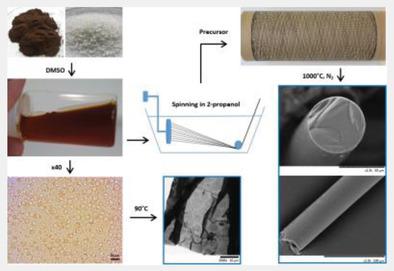当前位置:
X-MOL 学术
›
Adv. Sust. Syst.
›
论文详情
Our official English website, www.x-mol.net, welcomes your feedback! (Note: you will need to create a separate account there.)
Wet‐Spinning and Carbonization of Lignin‐Polyvinyl Alcohol Precursor Fibers
Advanced Sustainable Systems ( IF 7.1 ) Pub Date : 2019-09-18 , DOI: 10.1002/adsu.201900082 Marie Föllmer 1, 2 , Simon Jestin 2 , Wilfrid Neri 1 , Van Son Vo 1 , Alain Derré 1 , Célia Mercader 2 , Philippe Poulin 1
Advanced Sustainable Systems ( IF 7.1 ) Pub Date : 2019-09-18 , DOI: 10.1002/adsu.201900082 Marie Föllmer 1, 2 , Simon Jestin 2 , Wilfrid Neri 1 , Van Son Vo 1 , Alain Derré 1 , Célia Mercader 2 , Philippe Poulin 1
Affiliation

|
Lignin is a promising bio‐based precursor for sustainable carbon fibers. Limiting factors for their development include the brittleness of lignin and the lack of large‐scale production routes. Here, a simple and economic wet‐spinning method, suitable for the fabrication of fibers based on softwood Kraft lignin (KL) and polyvinyl alcohol (PVA), is proposed. These two polymers reveal a partial miscibility in solution, and form metastable dispersions in solid state. KL‐PVA fibers are prepared at a weight ratio of 70:30 and are carbonized without thermo‐stabilization. A tailor‐made temperature program leads to a decreased microporosity on the fiber surfaces. The obtained carbon structures at 1000 °C are found to be poorly ordered, leading to only intermediate mechanical and electrical properties. However, graphitic domains appear at temperatures above 1500 °C and indicate a high potential for the system.
中文翻译:

木质素-聚乙烯醇前体纤维的湿纺和碳化
木质素是有前途的生物基可持续碳纤维的前体。它们发展的限制因素包括木质素的脆性和缺乏大规模生产路线。在此,提出了一种简单经济的湿法纺丝方法,该方法适用于制造基于软木牛皮纸木质素(KL)和聚乙烯醇(PVA)的纤维。这两种聚合物显示出在溶液中的部分混溶性,并形成固态的亚稳态分散体。KL-PVA纤维以70:30的重量比进行制备,并且碳化后没有热稳定作用。量身定制的温度程序会降低纤维表面的微孔率。发现在1000°C下获得的碳结构排列不整齐,仅导致中等的机械和电气性能。然而,
更新日期:2019-11-14
中文翻译:

木质素-聚乙烯醇前体纤维的湿纺和碳化
木质素是有前途的生物基可持续碳纤维的前体。它们发展的限制因素包括木质素的脆性和缺乏大规模生产路线。在此,提出了一种简单经济的湿法纺丝方法,该方法适用于制造基于软木牛皮纸木质素(KL)和聚乙烯醇(PVA)的纤维。这两种聚合物显示出在溶液中的部分混溶性,并形成固态的亚稳态分散体。KL-PVA纤维以70:30的重量比进行制备,并且碳化后没有热稳定作用。量身定制的温度程序会降低纤维表面的微孔率。发现在1000°C下获得的碳结构排列不整齐,仅导致中等的机械和电气性能。然而,


























 京公网安备 11010802027423号
京公网安备 11010802027423号